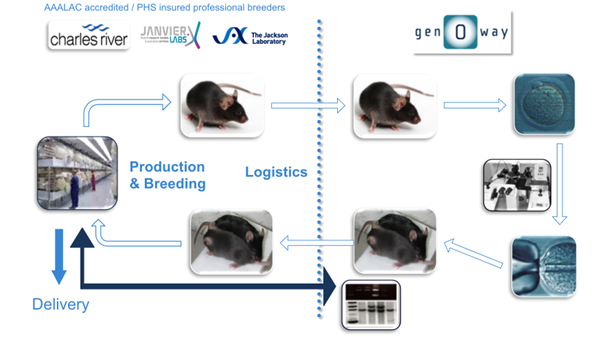Advantages
- Enables the in vivo switching on or off human amylin expression through the administration/ withdrawal of DOX
- Spatially restricted transgene activation: crossing tissue-specific rtTA/tTA lines achieves localized amylin expression without off-target effects.
- Single-copy Rosa26 knock-in for consistent expression: integration at Rosa26 locus ensures uniform expression
- Precise temporal control enables induction of amylin expression in chosen developmental stages to model late-onset type 2 diabetes and AD pathology
Summary
Amylin is a peptide co-secreted with insulin in humans which helps to promote satiety and regulate blood glucose levels after meals. In type 2 diabetes, amylin can misfold and oligomerizes into islet amyloid deposits, a process linked to accelerated amyloid pathology in AD. Traditional rodent models fail to recapitulate human amylin dyshomeostasis: endogenous mouse amylin lacks amyloidogenic propensity, transgenic overexpression often triggers developmental compensation, and chemical or viral systems lack both strict tissue specificity and temporal precision. Consequently, it has been difficult to determine how peripheral amylin fluctuations initiate islet amyloidosis and drive neurodegenerative processes.
Our researchers have developed a novel TRE-HuAmy knock-in mouse model in which the human amylin coding sequence is inserted into the ubiquitous Rosa26 locus downstream of a tetracycline-response element, enabling strict and reversible on/off control of human amylin expression when bred to any tTA or rtTA driver strain (for example, Ins2-rtTA for pancreatic β cells) and upon administration or withdrawal of DOX. By combining genomic targeting at Rosa26 with the Tet-ON/OFF system, this model delivers spatial and temporal precision in regulating pathogenic amylin levels in vivo, allowing induction and clearance of islet amyloid deposits at chosen developmental stages or in defined tissues and thereby directly addressing the link between diabetes and AD pathology.

Production of the TRE-HuAmy knock-in model is outsourced to professional breeders such as Charles River Laboratories, Janvier Labs, and The Jackson Laboratory.
Desired Partnerships